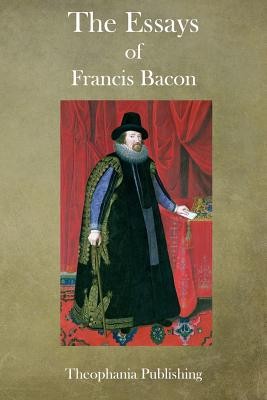
- We will send in 10–14 business days.
- Author: Francis Bacon
- Publisher: Theophania Publishing
- Year: 2011
- Pages: 172
- ISBN-10: 1770833315
- ISBN-13: 9781770833319
- Format: 15.2 x 22.9 x 0.9 cm, minkšti viršeliai
- Language: English
- SAVE -10% with code: EXTRA
Reviews
Description
Thank you for checking out this book by Theophania Publishing. We appreciate your business and look forward to serving you soon. We have thousands of titles available, and we invite you to search for us by name, contact us via our website, or download our most recent catalogues. Francis Bacon, 1st Viscount St Albans, was an English philosopher, statesman, scientist, lawyer, jurist, author and pioneer of the scientific method. He served both as Attorney General and Lord Chancellor of England. Although his political career ended in disgrace, he remained extremely influential through his works, especially as philosophical advocate and practitioner of the scientific method during the scientific revolution. Bacon has been called the father of empiricism. His works established and popularised inductive methodologies for scientific inquiry, often called the Baconian method, or simply the scientific method. His demand for a planned procedure of investigating all things natural marked a new turn in the rhetorical and theoretical framework for science, much of which still surrounds conceptions of proper methodology today. His dedication probably led to his death, bringing him into a rare historical group of scientists who were killed by their own experiments. Bacon was knighted in 1603, and created both the Baron Verulam in 1618, and the Viscount St Alban in 1621; as he died without heirs both peerages became extinct upon his death. He famously died of pneumonia contracted while studying the effects of freezing on the preservation of meat.
EXTRA 10 % discount with code: EXTRA
The promotion ends in 23d.06:46:41
The discount code is valid when purchasing from 10 €. Discounts do not stack.
- Author: Francis Bacon
- Publisher: Theophania Publishing
- Year: 2011
- Pages: 172
- ISBN-10: 1770833315
- ISBN-13: 9781770833319
- Format: 15.2 x 22.9 x 0.9 cm, minkšti viršeliai
- Language: English English
Thank you for checking out this book by Theophania Publishing. We appreciate your business and look forward to serving you soon. We have thousands of titles available, and we invite you to search for us by name, contact us via our website, or download our most recent catalogues. Francis Bacon, 1st Viscount St Albans, was an English philosopher, statesman, scientist, lawyer, jurist, author and pioneer of the scientific method. He served both as Attorney General and Lord Chancellor of England. Although his political career ended in disgrace, he remained extremely influential through his works, especially as philosophical advocate and practitioner of the scientific method during the scientific revolution. Bacon has been called the father of empiricism. His works established and popularised inductive methodologies for scientific inquiry, often called the Baconian method, or simply the scientific method. His demand for a planned procedure of investigating all things natural marked a new turn in the rhetorical and theoretical framework for science, much of which still surrounds conceptions of proper methodology today. His dedication probably led to his death, bringing him into a rare historical group of scientists who were killed by their own experiments. Bacon was knighted in 1603, and created both the Baron Verulam in 1618, and the Viscount St Alban in 1621; as he died without heirs both peerages became extinct upon his death. He famously died of pneumonia contracted while studying the effects of freezing on the preservation of meat.


Reviews